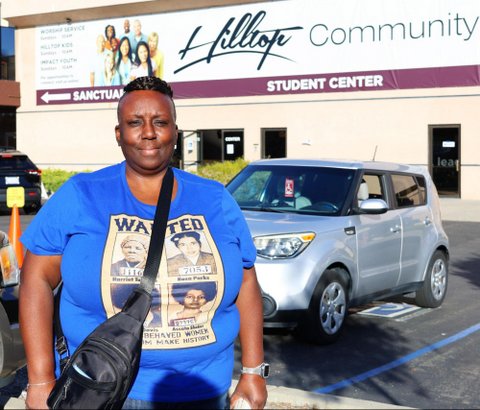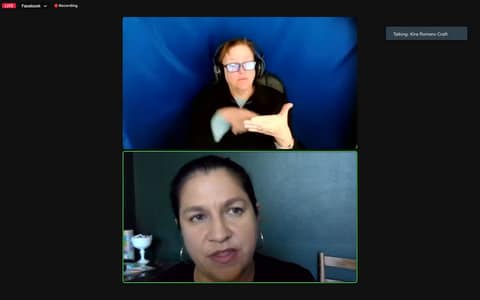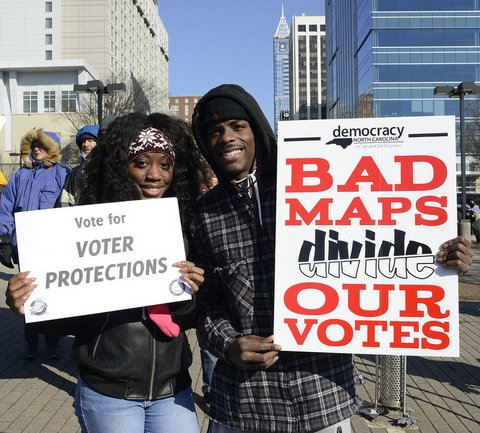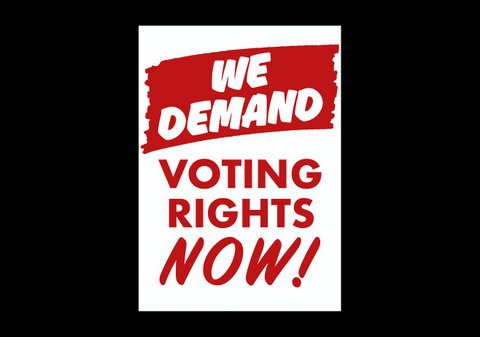
12 Oct Prop. 50 Is ‘Fighting Fire With Fire,’ California Officials Say

Angela Canidate said on Election Day 2024, “I know my ancestors fought and died for me to be able to vote.” Now, California voters are being asked to fight back against voter suppression efforts by voting yes on Prop. 50. (Joe Porrello / The CC Pulse file)
By Danielle Parenteau-Decker
California is in the midst of a special election that asks voters to decide whether to temporarily change the state’s congressional maps.
Gov. Gavin Newsom, state Sen. Akilah Weber-Pierson and Reps. Sydney Kamlager-Dove and Lateefah Simon spoke Tuesday at a virtual conference to Black media to get their message to Black voters about Proposition 50. They say the measure is an attempt to counteract a Texas redistricting plan designed to give President Donald Trump and the Republican Party more power and suppress voters of color.
“Proposition 50 ensures that when Black voters go to the poll, our voices count, and our voices are heard,” said Weber-Pierson, who represents Los Angeles. “Our elders and our ancestors fought too long and too hard for representation to be taken away now.”
What would Prop. 50 do?
If approved by voters, Prop. 50 would establish new congressional district maps that would be in effect for the 2026, 2028 and 2030 elections. After that, the power to draw and enact those maps returns to the state Citizens Redistricting Commission.
Opponents of Prop. 50 claim it is “deceptively worded” and suggests that a yes vote would keep the independent citizens redistricting commission. But Reform California says it actually eliminates citizens from the process. Newsom said such claims are untrue.
“We’re maintaining the independent redistricting commission. Any assertion that we’re not is simply wrong,” he said. “The independent redistricting commission continues in its current form with one exception: that we are going to — in response to what has occurred in these other states — move the congressional maps temporarily.”
He said state officials designed “maps that protected and preserved the Voting Rights Act and … the diverse representation that defines the best of California.”
The maps are also designed to help Democrats gain seats in the House, in which Republicans now hold a narrow majority with 219 members to the Democrats’ 213. (An additional Democratic member, Adelita Grijalva of Arizona who won a special election Sept. 23, still has not been sworn in as of Sunday.)
Why now?
“It’s high time that Democrats not just hold hands, talk about the way the world should be, maybe write an op-ed, but to do something more meaningful and substantive,” Newsom said.
That includes Prop. 50, he said, a direct response to efforts in other states, particularly Texas, to give Republicans an electoral advantage.
“We are fighting fire with fire,” said Kamlager-Dove, who represents Los Angeles. “If you are going to try to silence representation and activism and mobilization and engagement and voting in Texas, then we are going to use similar tools.”
While Texas is not the only red state trying to redraw its maps, it is the one that prompted California to respond. “A phone call Donald Trump made to [Texas Gov.] Greg Abbott started this whole process,” Newsom said. The “president of the United States has never made a phone call to a sitting governor to direct that governor to do a mid-decade redistricting.”
Typically, congressional district maps are redrawn every 10 years, following each census.
Newsom said Trump’s call was so unprecedented “even Greg Abbott recognized the nature and the consequences of what the president was demanding.”
According to Newsom, Trump called Abbott again and “said he’s quote-unquote, entitled — entitled to five seats.” “Entitled,” Newsom repeated for emphasis. “That’s why we call this state proposition the Election Rigging Response Act.”
Newsom said redistricting efforts largely favoring Republicans are underway in Missouri, Indiana, Utah, Ohio and Florida. Newsom said Prop. 50 differs from the other states’ redistricting efforts because “it’s temporary, it’s transparent, and it’s democratic.”
Why it matters
“Black Californians have been under constant attack by this president,” Weber-Pierson said. “Whether it’s denying relief after the devastating wildfires, militarizing our neighborhoods, warrantless arrests, increasingly making life unaffordable by his tariffs, dismantling the [diversity, equity and inclusion] programs and opportunities that were specifically designed to rectify past harms, erasing Black contributions and people from the history of America., or demolishing our healthcare system.”
How the maps are drawn always matters because “who holds congressional seats affects federal funding, resources, and priorities, like housing, criminal justice, education and healthcare,” she said.
>>>From The Pulse Archives:
Voting Districts Are About to Be Redrawn. Here’s Why It Matters<<<
Lateefah Simon, who represents the East Bay, implied things would only get worse if the Trump administration’s power remains unchecked. “Can you imagine three more years of absolutely no stopgaps?” she asked. She said Prop. 50 is “a temporary but essential shield” that keeps Black, Latino, Asian, Indigenous and working-class people “whole and visible, not just here but around the country.”
Simon placed Prop. 50 and other states’ redistricting efforts in a broader historical framework. “During Reconstruction, Black Americans held 2,000 elected offices,” she said. But “a violent backlash” followed and by 1877, that representation had been wiped out. “In 1965, the Voting Rights Act restored that promise,” Simon said. Then, in 2013, the Shelby v. Holder Supreme Court decision “gutted the act’s protections once again.”
What’s happening now is “geared up to take us back … to a Jim Crow South,” she said.
>>From The Pulse Archives:
Attacks on Voting Rights Evoke Jim Crow Era<<<
The No on Prop 50 committee says, California shouldn’t follow the actions of Texas and other states.
But the politicians speaking Tuesday say what California is trying to do is not what’s happening in other states. “They have spliced up the state with no voter feedback,” Simon said, referring specifically to Texas. Newsom said California voters are being asked to choose for themselves. Proposed maps are being presented directly to voters.
“Doing nothing certainly guarantees … we continue to lose the capacity to have any oversight; the system of checks and balances continues to degrade in real time,” he said. Newsom made these remarks after a question about claims Prop. 50 is a “slippery slope.”
Kamlager-Dove said people ought to be more worried about the “slippery slope of chaos, mayhem, fascism, tyranny, authoritarianism.” She says to prevent that, “vote for democracy, vote for Black resiliency, vote to stop the wreckage that’s happening in Washington, D.C.”
Californians have until Oct. 20 to register to vote and until Nov. 4 to cast their vote. Ballots may be cast by mail or in person. Mailed ballots must be postmarked by Nov. 4 and received by Nov. 12. Voters can visit the California Secretary of State website to search for early voting and vote-by-mail ballot drop-off locations.






No Comments